BestReviews is reader-supported and may earn an affiliate commission. Details
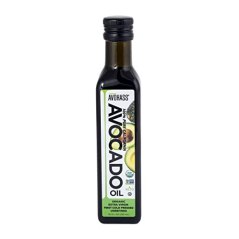
While on the expensive side, buyers rave over the quality, taste, and color of this organic avocado oil.
While on the expensive side, buyers rave over the quality, taste, and color of this organic avocado oil.
Cold pressed, extra virgin, and unrefined. Comes in an 8.5-ounce bottle. Good for cooking as well as skin and hair applications. Smoke point of 482 degrees. Good taste and color. Buyers highly recommend this option. A non-GMO product.
Some feel this oil tastes stale. Some say the bottle is a little small for the price.
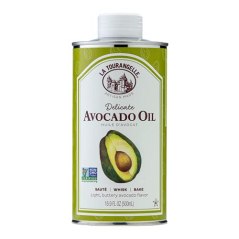
Buyers love the color, flavor, and aroma of this affordable oil, and it earns our nutrition expert's approval.
Buyers love the color, flavor, and aroma of this affordable oil, and it earns our nutrition expert's approval.
Comes in 16.9 ounces, packaged in a tin bottle. It's 100% pure and all-natural. Good for cooking, hair, and skin. Smooth, non-greasy texture. Quality flavor and aroma. Inexpensive. Deep green color.
Some find the taste and odor to be unpleasant.
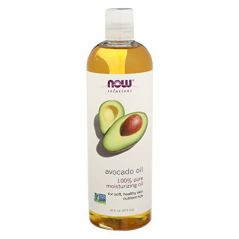
Draws praise for its use as a moisturizer and a massage oil, but note that this is not a food-grade oil.
Draws praise for its use as a moisturizer and a massage oil, but note that this is not a food-grade oil.
Non-GMO product. Nutrient-rich for skin and hair. Comes in a 16-ounce size and a clear UV light-protected bottle. Works well for moisturizing and massage. Light consistency. Was not tested on animals.
Not a food-grade oil; only for external use. Some claim the smell is bad.
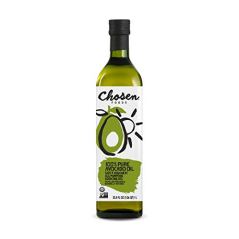
Our nutrition expert appreciates the high smoke point of this mild-flavored cooking or salad oil.
Our nutrition expert appreciates the high smoke point of this mild-flavored cooking or salad oil.
Cold-pressed and 100% pure. Primarily for cooking, but can also be used for skin and hair. Has a 500-degree smoke point. Good taste for salad dressings. Good-sized, attractive bottle. Mild flavor and aroma.
Some feel that this oil has no odor, taste, or color and that it's too refined or processed.
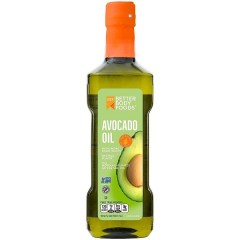
With a neutral flavor and a high smoke point, this is an excellent avocado oil for frying, baking, sautéing, and more.
With a neutral flavor and a high smoke point, this is an excellent avocado oil for frying, baking, sautéing, and more.
Naturally refined avocado oil with a flavor that's neutral and enhances the taste of foods. A smoke point of 500 degrees F makes it ideal for cooking many types of food. No preservatives.
The lid can be difficult to open. A few bottles contained oil with a cloudy appearance.

We recommend these products based on an intensive research process that's designed to cut through the noise and find the top products in this space. Guided by experts, we spend hours looking into the factors that matter, to bring you these selections.

We’ve been enjoying nutritious avocados for centuries in salads, on sandwiches, or even with a spoon. So, it should be no surprise that avocado oil is equally delicious and nutritious. Like olive oil, it’s a great oil for cooking if you’re concerned about heart health. Even better, it works wonders on your skin and hair, too.
Before you rush to add a bottle of avocado oil to your shopping cart, you should consider some factors. There’s a difference between food-grade and cosmetic-grade avocado oil, though some can be used for both. For food-grade oil, look for quality of taste, smoke point, and a pleasant or light odor. For cosmetic oil, consider consistency and aroma.
Whether you’re trying to eat in a more health-conscious way or looking for natural products for your beauty routine, avocado oil is a great addition to your arsenal.

Avocado oil is unique in that it’s the only cooking oil that’s made from fruit pulp. Avocado oil is extracted from ripe avocados, a process typically done mechanically by separating the skin and the stone. The flesh is then malaxated, or mixed, to start the oil-separation process. After malaxation, the avocado pulp is passed through a centrifuge system to separate the pulp and water from the oil. Then the oil is filtered through a series of screens to remove any additional impurities.
Oil is extracted from avocados in two ways: using an expeller-pressed method or cold-pressed method.
Expeller-pressed: With this method, the oil is squeezed straight out of the avocado without additional heat. However, the friction involved in the process may cause the temperature to rise. These avocado oils are milder in flavor and retain less of the avocado’s original color and taste subtleties.
Cold-pressed: This method keeps the avocado oil in a temperature-controlled space in which the temperature usually doesn’t exceed 120°F. Because the oil’s properties aren’t altered with heat, these avocado oils retain more of the avocado’s flavor subtleties, color, and nutritional value.
One isn’t better than the other. It really comes down to what you want to use the oil for.
Refined: This type of avocado oil is altered after extraction by bleaching, deodorizing, or both. These oils lose a lot of smell and flavor and may have additional color added. Refined avocado oil is better suited for cosmetic oil that will go on your skin and hair. But it’s worth noting that refined avocado oil has a smoke point as high as 500°F. So while unrefined avocado oil can lend food a nuanced flavor, refined avocado oil is a versatile cooking oil for stir frying, sautéing, searing, and barbecuing.
Unrefined: Aside from filtering out impurities, unrefined avocado oil is left alone after extraction. Unrefined avocado oil is good for culinary use, whether cooking or drizzling over food. Its noticeable taste will only enhance your food. Unrefined avocado oil has a similar smoke point to olive oil (around 375°F).
The health benefits of avocado oil are numerous. It’s high in beta carotene, protein, vitamins A, D, and E, potassium, and oleic acid. In fact, oleic acid, a heart-healthy fatty acid, makes up 70% of avocado oil and accounts for much of the oil’s nutritional content.
Studies link avocado oil to reducing high cholesterol and high blood pressure. It’s also been proven to reduce joint inflammation in arthritis patients. Better yet, avocado oil can also help with the absorption of other nutrients, such as the carotenoids in carrots.




















Avocado oil is versatile in that it can be used on the body or ingested.
Food-grade oil: Oils made for cooking are usually cold-pressed, as well as FDA inspected and approved. Food-grade oils are generally safe to use externally, too.
Cosmetic-grade oil: Avocado oils made for cosmetic purposes aren’t all meant to be ingested, so they aren’t FDA regulated. This may mean they’re more subject to containing impurities, though a quality manufacturer shouldn’t sell a cosmetic oil with toxins. Cosmetic avocado oil is often blended with other oils, such as lavender, chamomile, or orange blossom.
Cooking: Using avocado oil is simple. For cooking, simply coat a pan with the desired amount as you would with any cooking oil. You can also drizzle avocado oil on vegetables for roasting.
Cosmetic: Avocado oil has several uses for the body. To use on hair, you can massage a few drops into your scalp, rub it to the ends of the strands, leave it in for a minutes, then rinse. Avocado oil is also great as a hair mask after shampooing. Just put on a shower cap and leave the mask on overnight, rinsing it out in the morning. For skin care, you can add avocado oil to your regular lotion or put some on damp skin after a shower. For your face, avocado oil will add hydration to any facial mask.
The container varies depending on what you'll use the avocado oil for. Food-grade oil is commonly packaged in a metal container or dark green glass jar or bottle to shield the oil from light exposure. Some avocado oils also come as a spray, which is convenient for cooking. Larger quantities of food-grade oil may be sold in plastic jugs. Cosmetic avocado oil usually comes in a plastic bottle or an amber glass bottle with a dropper.
Avocado oil can range anywhere between $5 and $40 depending on the amount and quality of the oil. Prices largely depend on the avocado oil's purpose.
Quite a few avocado oils fall into the $5 to $15 price range. On the lower end of that, you can find small two- to six-ounce bottles of cosmetic avocado oil. Eight-ounce quantities are closer to $10, while a decent eight-ounce bottle of food-grade oil is at least $10.
Food-grade avocado oil that costs $15 to $25 may be from cold-pressed, organically grown avocados. You can find larger quantities of oil (up to a liter) in this price range.
There’s not much reason to pay more than $25 unless you're getting a gallon container or specialty product imported from another country.

A. If stored properly, unopened avocado oil can last up to a year, and opened avocado oil can last up to eight months.
A. Avocado oil is on the heavier side, so it may clog your pores if you have naturally oily skin. It’s better suited for people with dry skin. Avocado oil not only hydrates skin, but it can shrink pores, treat skin conditions, and help reverse signs of aging.
A. Avocado oil doesn’t contain the chemical properties to strip color-treated hair. In fact, its plethora of vitamins will nourish and rehydrate chemically damaged strands.
Get emails you’ll love.
Learn about the products you’re wondering if you should buy and get advice on using your latest purchases.
